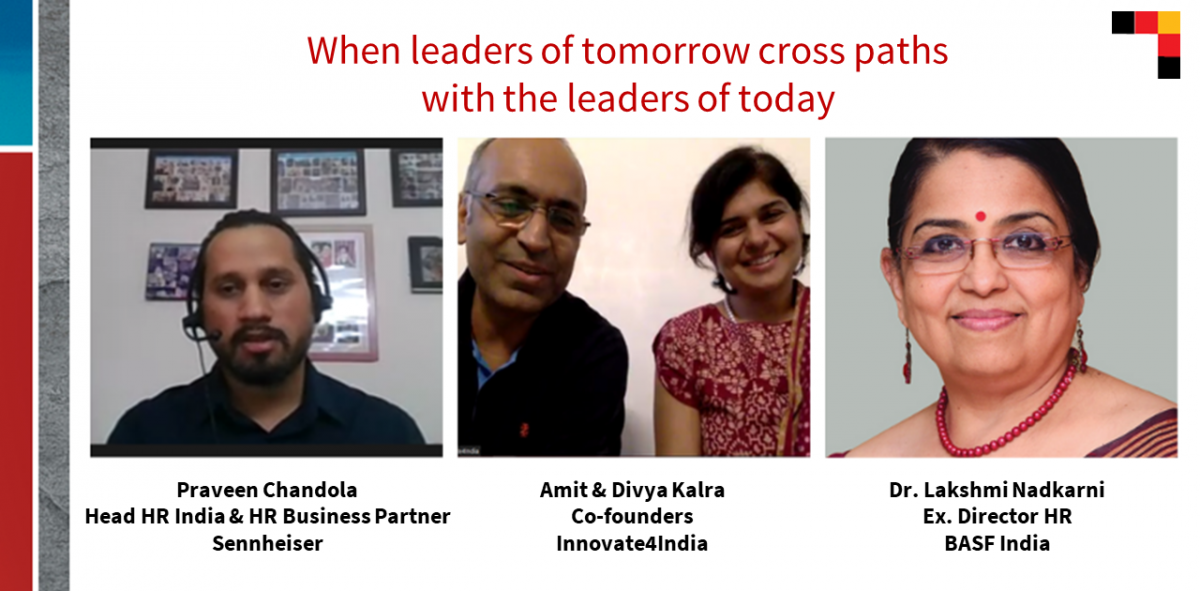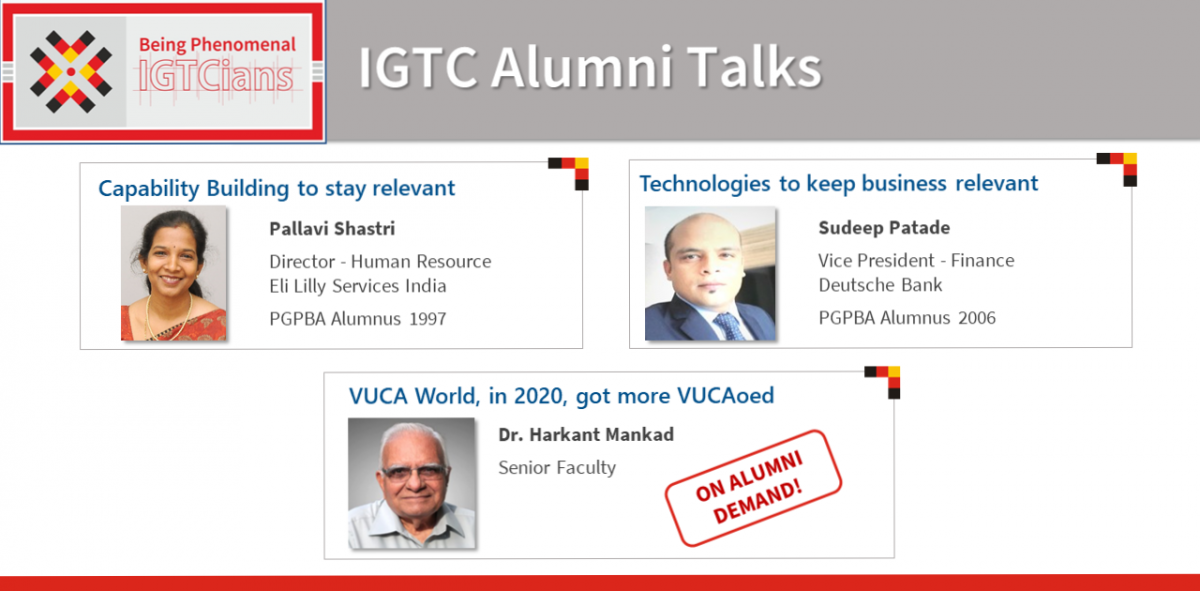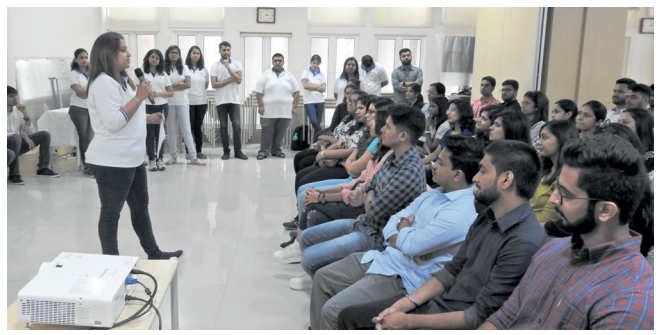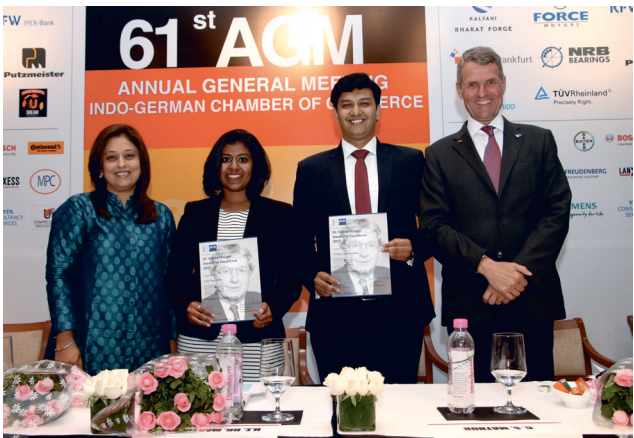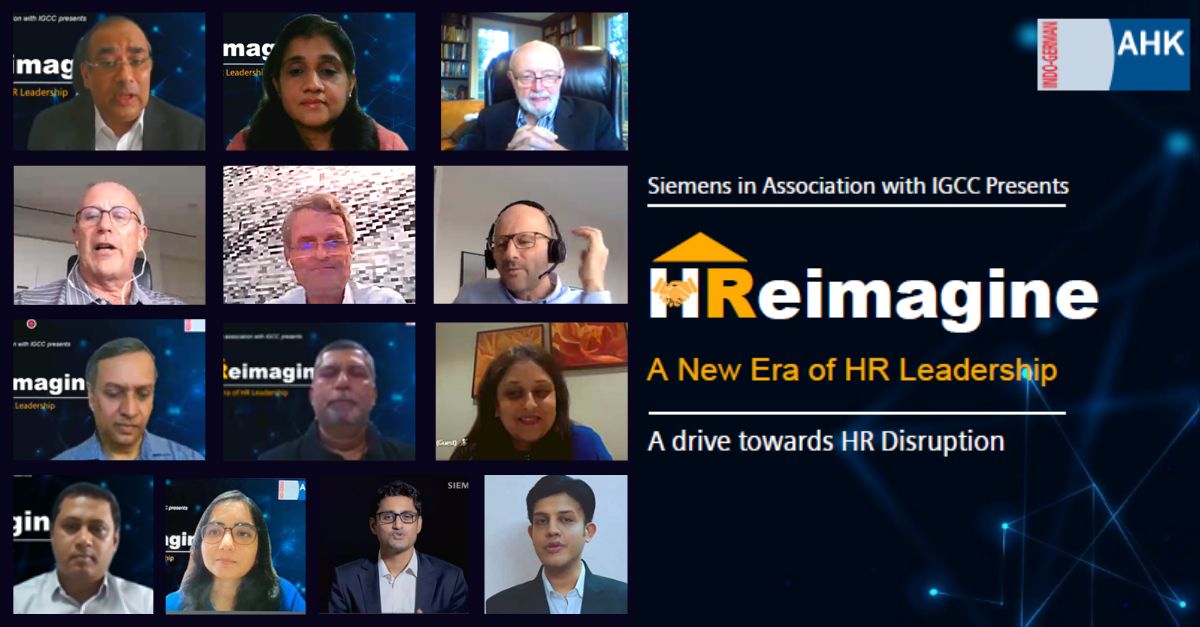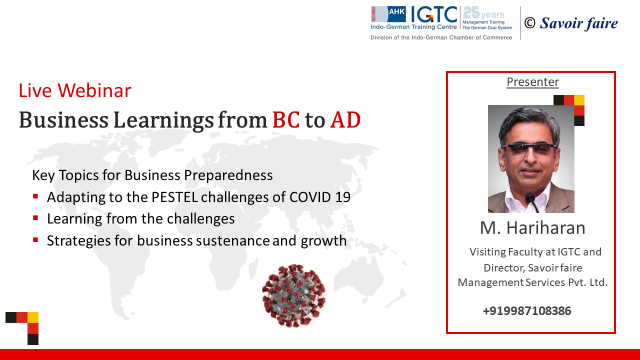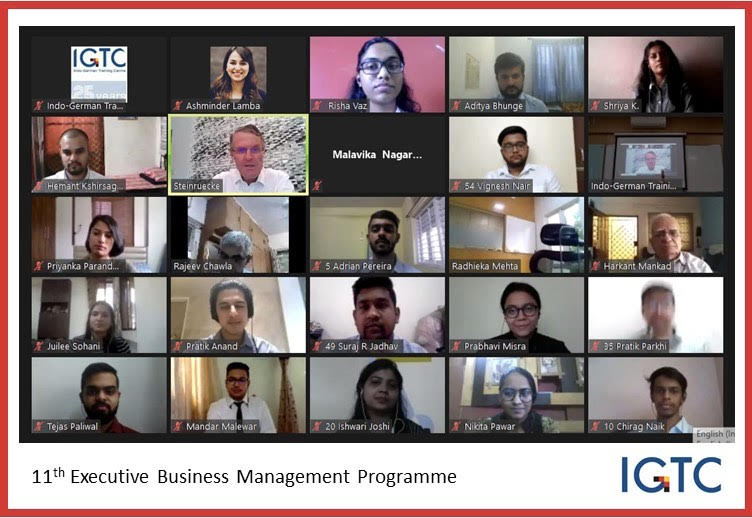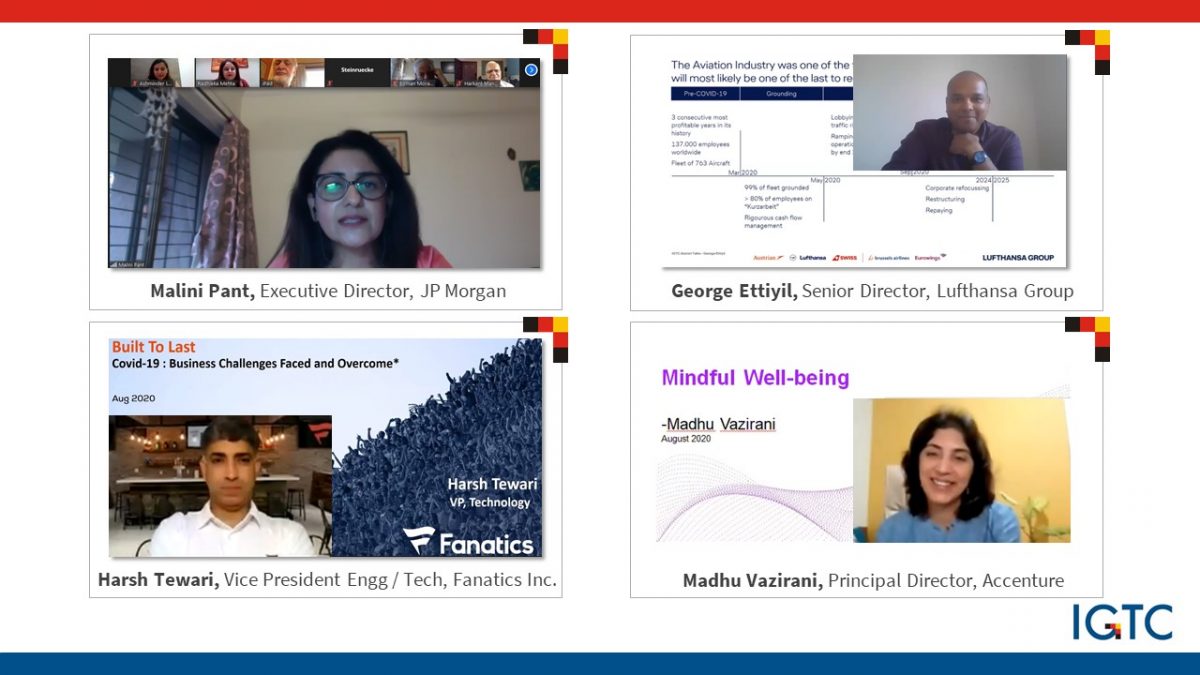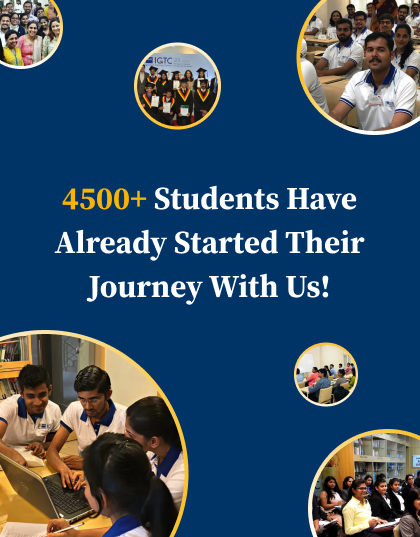Testimonials
When leaders of tomorrow cross paths with the leaders of today!
The anecdote goes ‘One teaches; two learn’, however at the Indo-German Training Centre this equation is slightly modified; when brilliant industry professionals candidly engage with PGPBA students; we can only say ‘One teaches; a hundred learn’.
Our eminent guest speakers for the term included:
- Praveen Chandola, HR Head India and HR Business Partner, Sennheiser India
- Amit Kalra and Divya Kalra, Co-founders, Innovate4India
- Dr. Lakshmi Nadkarni, Ex. Director Human Resources, BASF India
Praveen Chandola: 20th October 2020
A human resource professional, Praveen Chandola has been a part of Sennheiser India for over 13 years. With expertise in training and coaching, he imparted his ideas and experiences on the subject to the students. The key discussion revolved around coaching; and its distinction from counselling, mentoring, consulting, training and athletic development.
Coaching is all about asking questions on a deeper level, it helps raise awareness around an issue and generates new thinking in order to arrive at a solution. The coach will only move you in the direction of your goal, and it is you that needs to find your path.
To make an impact to the IGTC students, Praveen Chandola offered to coach 5 students pro-bono for a span of 3 months.
Amit Kalra & Divya Kalra: 26th October 2020
Amit Kalra; member of the management team at Hilti and Divya Kalra, a change maker; together have co-founded Innovate4India.
With the aim of grooming conscious leaders, Innovate4India works around 4 ideologies that can change India:
Build Communities of Purpose, Frame 108 Questions by 2021, Create Challenge Contests, Build Communities of 200000 Innovators by 2025. The four areas that they wish to work in include Waste2Wealth, Jalvitran, Linking the Unlinked and Rural Connect.
In a move to promote various sustainable development goals among IGTC students, Innovate4India encouraged them to join the momentum and to submit proposals for a month long internship. 5 teams put forth their proposals on the topics – Scraping old cars and batteries, Safety of stray animals, Over-population, Plastic waste management, and Education in rural India. After review, the first two proposals have been shortlisted for the internship.
In a move to promote various sustainable development goals among IGTC students, Innovate4India encouraged them to join the momentum and to submit proposals for a month long internship. 5 teams put forth their proposals on the topics – Scraping old cars and batteries, Safety of stray animals, Over-population, Plastic waste management, and Education in rural India. After review, the first two proposals have been shortlisted for the internship.
Dr. Lakshmi Nadkarni: 1st December 2020
A stalwart in the field of Human Resources, Dr. Nadkarni has been closely associated with IGTC for over a decade.
The VUCA world in 2020 has been amplified leaps and bounds. The commencement of internships at several training companies has resulted in a shift from Paying to Learn to Paid to Perform & Learn. It will give the students an opportunity to launch themselves.
The key insights of the session included: observing and blending with the organizations culture, the importance of 5 C’s – Choice, Collaboration, Communication, Critical Thinking & Creativity, expected behavioural traits, ethics, anticipated challenges, the difference between policy and politics, the role of Values, Beliefs and Morals in the organization etc.
We are no stranger to the drastic changes that have surrounded us in the last couple of months, and we expect such changes to continue for the generations to come. These sessions have made us realize that a vision of the future is now crucial; and coaching conscientious future leaders must become an educator’s resolve.
IGTC Alumni Talks: Our Signature Series Rejuvenating the Alumni-Faculty Bond
‘Destiny knows the way to find you’. It was destiny itself that led to the crossing of over a hundred paths on a single evening at the Indo-German Training Centre. Ushering in the second edition of IGTC Alumni Talks: Our Signature Series on Friday 30th October 2020, with over 185 participants; in attendance, an IGTCian can only say ‘Amor Fati: Love your Fate’.
As IGTC inches closer to its 30th anniversary, we look forward to connecting every person who has been a part of this spectacular journey since its inception; this includes students and alumni from both the Post Graduate Programme in Business Administration as well as the Executive Business Management Programme and the esteemed faculty.
The speakers for the evening were 2 distinguished alumni, who have excelled in their roles and experiences in industry.
- Pallavi Shastri, Director – Human Resources, Eli Lilly Services India
- Sudeep Patade, Vice President – Finance, Deutsche Bank
The IGTC Alumni Talks also had a very special addition to its agenda, ironically it wasn’t an alumni but our very own senior faculty, Dr. Harkant Mankad. Host Radhieka Mehta, Director – IGTC welcomed all the alumni, faculty, corporate partners and current students to the event. All the speakers addressed topics that they are passionately involved in, all the views expressed were purely in their personal and not professional capacities.
Insights on “Capacity building to stay relevant” by Pallavi Shastri, Director – Human Resources, Eli Lilly Services India.
Her mantra is anchored on 3 pillars: Collective Intelligence, Systems Thinking and Keep Learning.
- We are part of a bigger whole, and this impacts everything and affects our life in infinite ways. In order to be relevant; ‘built to adapt’ takes precedence over ‘built to last’.
- Adaptability is key to a successful transformation while accounting for vulnerability, reflection, and fostering curiosity to drive change in the long term.
- Capability is broader than competence, it encompasses: Competency, Ability, Mind-set, Learning and Openness.
- Collective Intelligence: The brain of many is greater than the brain of one. Embrace a culture of celebrating failures. You do not need to know everything. Fail fast; fail safe. Find yourself a mentor.
- Systems Thinking: The need to look at the bigger picture and our position in the network of ecosystem. Reflect and Connect. With different kinds of people; from NGOs, various forums, as diverse as possible, to gain insights about ourselves and ecosystem around us. This will help us to act instead of react.
- Keep Learning: Keep sharpening your saw; continue to nurture your curiosity through continuous learning. Learn one skill a year, and take up one project for change, this will trigger the collective intelligence.
Insights on “Technologies to keep business relevant” by Sudeep Patade, Vice President – Finance, Deutsche Bank Group
- Varied technologies are available and can be used as enablers, we need to decide which of them is more relevant
- Feasibility of mobile technology has led to a large influx of companies on this mode. Remote working technologies have increased collaboration and has made remote working a reality.
- Need for data protection has increased cost and has put IT under pressure.
- Open Source Software is used across many fields and is here to stay. It enables users to switch from one software to another without spending much.
- Cloud Computing has gained prominence in 2020 and forms a large part of the social network. Cloud will not change the world, but will run the world, it is the next big enabler.
Insights on “VUCA world in 2020 got more VUCAoed” by Dr. Harkant Mankad – Senior Faculty, IGTC
- Markets are going south, uncertainty is at its best. COVID has created more questions than answers. You can’t be under illusion or delusion in the COVID world. COVID is capitalist in nature, in its approach to wealth, and income distribution.
- IT is the biggest winner in the pandemic, the biggest losers are Construction, Airlines and Migrants.
- However VUCA the world gets, the next decade belongs to China and Ali Baba.
- There is a 5% contraction in global GDP, but an increase in global population by half a million people. China’s population will age, and India will have a more assertive younger population, hence reducing dependence.
‘Change is the only constant’, but what happens when change and uncertainty become the norm? How do business and individuals cope in the prevailing context? One thing is for certain, businesses and individuals now have to accept their new found realities, however unappealing it may seem when compared to past realities. Isn’t this the whole point of resilience?
Design Thinking for NürnbergMesse India A specially curated training programme
“Thinking like a designer can transform the way you develop products, services and processes – and even strategy”- Tim Brown, CEO, IDEO (Innovation Design Engineering Organization)
The new normal necessitates a new way of learning, working and achieving results, and IGTC had to lead by example during this time. Inspired by the above quote, IGTC engaged with its senior faculty member Mr. M Hariharan to curate a special programme on Design Thinking for NürnbergMesse India, one of the 15 largest trade fair companies in the world with a portfolio of 120 national and international trade fairs and congresses at the Nürnbergberg location and worldwide. Faculty Hariharan, Director, Savoir faire Management Services Pvt. Ltd., is a certified expert in Design Thinking from MIT Sloan. He has conducted 700+ training programmes on Lean Management, Strategic Cost and Profitability Management, Theory of Constraints and Design Thinking.
Spread across 6 sessions of 2 hours each over a period of 3 weeks, the programme aimed to instill the design thinking approach and methodology for business excellence. It engaged with the audience to:
- Innovatively traverse through the unstructured PESTEL challenges keeping customer-focus as the central theme
- Broad base the innovation mindset and channelize the already present creative minds
- Create a collaborative multidisciplinary approach to look at the big picture, think holistically, ideate and implement customer-centric solutions
- Be vehemently empathetic on users and stakeholders and relentlessly search for solutions to human problems
- Bring in response-ability; the ability to respond to changing customer needs
- Nurture an environment to fail fast fail safe
The senior management team of 29 managers immersed themselves into the programme framework – Inspiration, Ideation and Implementation – to apply their learnings and emerge with 6 live projects relevant to their industry. The mapped the entire trade fair process from conceptualization, designing, marketing, organizing and benefitting from it. Their final presentations were based on the following topics:
- Virtual Event on Broadcasting Technology
- Existing Event on Cold-Chain, Industrial Refrigeration & Reefer Transportation
- Existing Event on Organic Products
- New Event on Hybrid Power and e-Battery
- Marketing strategies to promote virtual events
- Operations handbook for virtual events
Despite the various, existing challenges, the Design Thinking Training Programme was an extremely satisfying engagement that created an impact on all the participating managers and the organization. This is what some of them had to share:
“The design thinking course equipped us with greater understanding of the customer journey and enabled us to analyse their needs and concerns. It delved into its core reinforcement theory that ultimately it’s about our customers at the centrepiece in whatever we do at our workplaces. The course then put spotlight on implementing the design thinking approach to our ongoing exhibition planning and work process. It is much recommended course for everyone in business. The faculty was brilliant and our journey with the course in its every detail was truly insightful.”
Guru Prasath, Group Director, Member of Management Board, NürnbergMesse India Pvt. Ltd.
“The design thinking programme tickled our laxing common sense intuitions. We learnt to understand and ascertain needs of others, not to assume and form a perspective i.e. an immersion process. It made us learn a new concept of thinking and behavioural changes, which we need to adapt, practice and follow in our daily life rather than on a project basis.”
Satyendra Mehra, Group Director, Member of the Management Board, NürnbergMesse India Pvt. Ltd.
The design thinking training program was extremely engaging and invigorating, inspiring us to think beyond the realms of project management. The whole process from ideation to prototyping, helped us map the journey of the end user and identify points where our services and offerings could be better aligned and more catered.
Rucheeka Chhugani, Director, Corporate Affairs and Communications, NürnbergMesse India Pvt. Ltd.
“HReimagine – A New Era of HR Leadership”- Indo-German HR Partner Meet
On Friday, 16th October 2020, Siemens Ltd. hosted the quarterly meet of the Indo-German HR Partner Forum on the topic “HReimagined: A New Era of HR Leadership”.
Organizations have been facing umpteen challenges in unknown situations; with no defined solutions. The pressure has been mounting on the HR partners to step up their game, to focus on inclusion, leadership, learning, empowerment, AI and technology, communication, skill development and information management, and to provide solutions to secure the future of their employees and the organization. Hence, as a part of the Indo-German HR Partner Forum, professionals connect, collaborate and share best practices that empower them to create new opportunities for businesses and to build a stronger ecosystem.
Dr. Shilpa Kabra Maheshwari, EVP & Country Head HR, Siemens Ltd. launched the event by setting the context and by sharing what Siemens is doing around the key pillars of the theme. Key insights from her presentation included:
- The new era of HR Leadership is anchored around four key levers – Leadership 4.0, Continuous Learning, Workplace Strategy and Technology.
- Siemens is moving towards a Trust-Based Leadership, where managers empower teams and outcomes are most important. They are shifting away from the traditional PMP to growth talks & development.
- The Siemens Scholarship program for economically weaker backgrounds, especially women, and the apprenticeship program at the Siemens Technical Academy are gaining recognition globally, as the students continue to develop business aligned innovations.
- Power packed sessions on important people topics and AI based learning platforms are rolled out for employees to learn anytime anywhere.
- HR Chat bot called CARL is being used to answer questions on transactional topics, and digital tools such as concept board are being used to collaborate and ideate within and outside Siemens.
- Mobile working guidelines are released to allow employees to work from home for 2-3 days in a week.
Sunil Mathur, MD & CEO, Siemens Ltd. set the business context and shared perspectives on how to stay ahead of competition in this new normal. Key insights from his inspiring address included:
- Change will be constant and disruptive. Business continuity needs to be looked at holistically.
- Shareholders will expect more focus on society, environment, government and law issues.
- Customers are demanding more and asking for customized solutions within limited time. Collaborating with customers in this virtual environment will be the key.
- Classical supplier relationship are changing to co-developing solutions for the customer. This will require fresh competencies and new ecosystems.
- With digitalization coming in, geography has become history. The traditional mindset that we need the workforce to be close to customer is now changing. There is a need for a skilled and competent workforce that can deliver value to the customer from anywhere.
- Company will be as strong as the weakest link in the leadership team.
- Most important priority is Communication, Communication and Communication.
Bernhard Steinruecke, Director General, IGCC acknowledged and applauded the efforts of the HR professionals in maintaining business continuity over the last six months. He mentioned that the German government has recently introduced a new Indo-Pacific strategy where it is now questioning the over dependency on few countries which was realized during this whole pandemic situation. They are now keen to shift the focus to other countries such as India, Australia etc. The ‘can-do’ attitude of Germans and the ‘never-give-up’ attitude of Indians will only further strengthen the Indo-German relations. On this optimistic note, Bernhard Steinruecke also announced his upcoming retirement and introduced his successor Stefan Halusa, Designate Director General, IGCC to the Indo-German HR Partner Forum.
The meeting moved on to a Panel Discussion with 3 eminent HR partners: KS Harish, Country Group HR Head – South Asia, Bayer, Mr. Suresh BR, Country Head HR, Bosch India and Dr. Shilpa Kabra Maheshwari, EVP & Country Head HR, Siemens
Key takeaways:
- In the new normal, Bayer has passionately communicated its vision, “Health for all, hunger for none” and refreshed the 12 attributes under their LIFE values – Leadership, Integrity, Flexibility and Efficiency to make their employees understand the company vision clearly. Harish had an interesting perspective that the employees’ skills will be the new currency of the future. Keeping this in mind, they have stepped up the learning and social initiatives. Self-learning, micro-learning and wellbeing programs have been introduced for employees. Organisation wide learning applications have enabled the field force to onboard customers to new technology platforms. In the Pharma business, doctors have moved to meeting medical representatives through digital connect programs, while in the CropScience business, they have successfully migrated their customers, the farmers, to the digital platforms to share agricultural practice information and demonstrate product efficacy.
- Bosch has been positively handling working virtually and ensuring employee engagement and collaboration. The pandemic has certainly accelerated the pace of change and there is super energy and enthusiasm to bring about a change at Bosch. According to Suresh, employee experience will be the DNA of the organization. It is important to reimagine work and redefine the workplace design, which will define how work gets done.
- Siemens believes that the gig economy will change the way we work. Millennials desire work, which is challenging along with flexibility. Full time and part time work has been implemented and flexi/freelance work is being implemented. Sabbatical options are also available to allow employees to pursue their passion and enhance their skills. There is a significant focus on reskilling and upskilling for future employability.
Dr. Juergen Morhard, Counsel General, Federal Republic of Germany in Mumbai addressed the high-profile audience by praising the IGTC management programs and the high quality of engagement maintained with the German companies. He endorsed the responsibility of the leadership in today’s turbulent times to ensure how their teams are coping, their wellbeing, the impact of digitalization and the acclimatization to home offices. On behalf of the HR Partners, he warmly welcomed Dr. Wayne Brockbank, Clinical Professor, Ross School of Business, University of Michigan as the Power Speaker on the “Role of HR in Creating Market Leadership”. In his keynote address to the HR Partners, Dr. Brockbank touched on the following:
- Shared detailed results of research conducted to understand the challenges of market leadership faced due to the environmental trends impacting the world today such as high velocity disruptions, complexity, dynamic and non-linear inconsistencies.
- Questioned the fundamental HR assumptions and biases to make all the partners understand that HR’s role is not only to build individual capabilities but also organizational capabilities to win in the market at a speed and quality that is at a higher level than the competition.
- Demonstrated the use of insightful statistics to objectively measure the effectiveness of HR activities and to derive the value created by HR for various stakeholders.
- Explained the correlation among Employee Performance HR, Strategically Integrated HR practices, HR Analytics and HR’s role in Information Management on business performance, external customers, investors, communities, regulators, line managers and employees.
- Emphasized the need to fully understand the company portfolio before designing the HR strategy and shared the sources of competitive advantage and their weightage in overall success. Raised curiosity to introspect and think on the question, what is the culture we need to have to increase competitive advantage?
- Exemplified Disneyland as the best example of customer service that makes everyone go back again and again.
Dr. Brockbank concluded his presentation by giving the HR Partners the AAA model as a mantra for success:
- Acquire and Explore; be intellectually curious, access information and insights from qualitative and quantitative sources with an open mind; understand the business question
- Analyze, prioritize and debate what is important and what is less important; have honest discussions with different views and perspectives to inform better conclusions
- Apply to Action the information that is available
This insightful meeting was attended by 60+ HR Partners from leading German organizations. The 3.5 hours long engaging discussions and exchange of ideas came to an end with the realization that it is the right time to look at the opportunities that this pandemic situation has brought with it. This event surely gave the platform to strategize on the way forward beyond these turbulent times.
To know more about the activities of the Indo-German HR Partner Forum, please connect with Radhieka R Mehta, Director, Indo-German Training Centre on director@igtcindia.com.
Lockdown Buster: Learning Transformation
It was mid-January when we the students of IGTC PGPBA Batch 2019 – 2021 were undergoing our Practical Training Term I at our respective interning companies. While we were intensely enjoying the exposure of working on the projects, the internet was getting flooded with mystery analysis of a deadly Coronavirus spreading in China. The initial reactions were typical as we scrolled over social media, filled with random memes, fake videos and fake home remedies but we never imagined then that this local Chinese virus was about to come to us in the next few weeks capable of causing a colossal impact.
Beginning February 2020, we returned to IGTC from our interning companies for Theoretical Term II with great enthusiasm for being back in class with our peers. We were charged up for the upcoming term with more interesting subjects in our curriculum and with even more experienced faculty. . The term was just shifting gears and picking up pace, when the very virus soon become a serious outbreak globally. The COVID-19 pandemic had hit India now with several positive cases triggered as people travelled.
On 12th March 2020, observing the trend of the virus of the European nations, the Government of India comprehended India’s situation, and decisions were made to slow down various sectors starting with tourism and education first. By this time there was an abrupt halt as all the educational institutes were shutting down leading to a natural demotivation amongst the student community. The economists globally forecasted an upcoming mammoth recession. IGTC similarly decided to shut to abide by the strict orders of the state government. Natural fear and chaos were amongst us students too, but the IGTC director, faculty, and administration team had created a learning plan for us. They demonstrated tremendous strength, agility, and focus to continue the delivery of lectures on the online platforms immediately. It was merely with a break of 2 days that IGTC ensured that we migrated to our lecture schedules online. IGTC kept being optimistic, motivating and had its principle clear, “If you can’t FLY, then RUN. If you can’t RUN, then WALK. If you can’t WALK, then CRAWL. But whatever you do, keep the wheels in motion.” This was an inspiring situation for us while the country was getting into total lockdown. We were made to experience nothing but positivity.
As the new normal continued, we encountered a bunch of hurdles such as internet instability, lagging bandwidth and videos, sound and mic issues, senior faculty adapting with the new digital platform, and the new way of online teaching, but more importantly, time management, discipline, and self-motivation. All of us were bound to sit in front of our laptops for almost 12-14 hrs a day including 6-8 hrs of online classes with group/individual projects, subject-wise homework, and regular after-class studies. Non-Mumbaikar students started leaving for their hometown since the situation did not seem to improve. The graph rose steeply with rising cases worldwide and it was time we all became aware of the seriousness and massive impact of the pandemic on the global economy. Lockdown situations around and terrifying news all over acted as a fuel to the fire impacting our emotional state of mind.
IGTC stood by us rock-solid to boost our morale constantly, they guided us to look beyond the horizon to aim for the silver lining. The faculty, by giving examples of COVID-19 situations, tried their best to deliver us the key learnings. They hinted to us that if we learnt to rise and shine bright in such unforeseen events, we will develop a unique spirit in ourselves and be the resilient, unbeatable ones. The new mantra was “Zusammen sind wir stark!” says Yashashree Borse, Management Trainee, Siemens Ltd. By the end of Term II, we all successfully faced rapid fires such as quizzes, polls, online mid-term tests, engaged in group case study discussions in breakout rooms, submitted all our assignments, put under the grill of online vivas and presentations, and finally completed written examinations under a self-declared ethical pledge of integrity under the observation of the IGTC team! “All permutations and combinations are possible at IGTC!” quotes Akshay Bhagwat, Management Trainee, Hirschvogel Automotive Group.
After 3 months, we can proudly say that we have all sailed through it all. Be it common issues or personal problems, they were all attended immediately and on priority by the IGTC admin and faculty. A suitable solution to every problem was applied to every respective issue via regular open discussions and feedback daily. Being a part of IGTC, everyone has graciously accepted the new normal. We are trying our best to adapt and imbibe the core values of the IGTC anthem “Nurturing Curiosity, Seeking to Innovate, Infusing Optimism, and Inspiring Excellence.”
Unlike few B schools which were not prepared to face such unpredictable situations, IGTC has shouldered the responsibility and accountability of educating us; its precious batch of 100 students; to stand apart from the crowd and to build a confidence to overcome every possible hurdle on the path all along, be it our personal or corporate lives. “Now we know that there are no dead ends, only sharp turns, but there is always a way out” quotes Namita Gulavani, Management Trainee, Siemens Ltd.
This crisis has changed us and we have a great story to tell! Change management was a subject in our curriculum, now we can say that we have lived through it at IGTC.
Article contributed by Ronak Contractor, Management Trainee at Siemens Healthineers, PGPBA Batch 2019 – 2021
IGTC’s Admission Process 2020: Overcoming Covid-19 crisis
The admission process is the first step towards a new future of any student. And to fulfil that desire, IGTC proficiently took its admission process forward online without having to putting anyone’s future on hold.
The various challenges before the IGTC Management included:
- How to conduct the group interaction and selection process for the applicants?
- How to retain good applicants as other business schools were moving ahead quickly with the process?
- How to process admissions without university examinations pending for some applicants?
- How to conduct the selection for the “meritorious, but less privileged applicants” for the Siemens Scholarships?
- How to get the partnering companies on board for internships amidst so much uncertainty and chaos?
The difficulty along the path was to bring the companies on board to conduct the Personal Interview Process and to adopt trainees for the coming year and to uphold IGTC’s USP of the German Dual System. IGTC consulted the Indo-German HR Partner Forum to tailor a few key processes and adapt to the current lock-down situation.
Following this decision, almost 200 applicants from various cities across the country underwent the Online Test and Group Interaction over April and May 2020. After great rigor and scrutiny, 95 applicants were finally shortlisted to meet the companies for internship selections.
Despite business challenges, ARaymond Fasteners India Pvt. Ltd, B Braun Medical (India) Pvt Ltd, Bajaj Allianz General Insurance Co., Bosch Automotive Electronics India, Bosch Limited, Brose India Automotive Systems, Covestro India, DBOI Global Services, Ethosh India, Faurecia India, Forbes Marshall, Hafele India, Helpline Impex, Hirschvogel Automotive Group, Knorr-Bremse Technology Center India, KSB Ltd., LANXESS India, Pune Gas Systems, Schott Kaisha, Siemens, T-Systems ICT India and Wirtgen India were extremely supportive in participating in the Trainee Selection Process. They interviewed applicants for various profiles ranging from Sales and Marketing, Digital Marketing, Corporate Communication, Project Management, SCM and Logistics, Accounting and Finance, Human Resources and IT.
Frequent online interactions and briefings on every company requirement and profiles, online trainings on how to tackle content for online interviews, how to develop an effective on-screen presence ensured that there was no gap in the process and the applicants remained enthused and engaged over a period of 6 weeks. The Company – Trainee matchmaking process was completed with great precision. Admissions were closed in mid-June, just like IGTC would like to believe, it’s a normal year!
“Even in this critical situation of lockdown, IGTC has conducted the admission process very professionally. A couple of interactive sessions were also conducted online which helped us to prepare for interviews as interaction at a personal level by physically visiting the institute was not possible during this pandemic. The personal involvement of all the faculty members ensured that everyone gets an equal opportunity to prove oneself and gain admission to this prestigious institute.”
Kshipra Godbole, selected by Faurecia India, PGPBA Batch 2020 – 2022
“All experiments are learning experiences even when they don’t go as planned but talking about IGTC, the experiment was very well planned and executed by all members. All representatives were always active and available on time by working hard from home. This is a good example of dedication and teamwork.”
Suraj Jadhav, selected by Forbes Marshall, PGPBA Batch 2020 – 2022
The precise exchange of information and careful hand-holding throughout the interview process was unlike any other. While everyone was filtering students using mark sheets and entrance test percentiles, IGTC evaluated me as a human being. The application form was a thorough personality check. Writing multiple essays and answering several thought-provoking questions, I could introspect and discover my true strengths and aspirations. Today, I believe I know a lot more about myself than what I knew earlier. I thank you all for your guidance and am looking forward to interacting with you soon, but please not over the internet this time!
Aditya Mukund Deo, selected by Siemens Ltd., PGPBA Batch 2020 – 2022
Digitalization@IGTC
“Nothing has more strength than dire necessity.” The perfect example of this statement is the movement toward digitalization in the face of the Covid-19 pandemic. The world didn’t have a choice and it was a time to demonstrate agility to rise to the occasion. IGTC certainly believed in being the one to showcase this. Fortunately, IGTC had proactively begun its journey toward digitalization since 2018. This pre-emptive effort outshined in the summer of 2020 when the world came to a standstill.
IGTC’s highly customized, digital dashboard called “Access@IGTC” was developed by Autuskey Private Limited, an IT consulting company in Pune. It is a one-stop-shop for all the IGTC premier workflows. It is a platform, which connects across all the IGTC stakeholders including the IGTC team, IGTC faculty, PGPBA students and their parents, EBMP managers, and IGTC partnering organizations. The last piece, the IGTC alumni module, is still in the development stage.
The digital dashboard facilitates the following features:
- Online applications at IGTC: Receipt of online application forms, application form fees, recommendation letters, supporting identification and academic documents.
- Admission process at IGTC: Allocation of online test and group interaction slots, process evaluations and marks, allotment of partner training companies and dispatch of admission letters.
- Academic Programme Management: Student profiles & resume management, timetable and lecture schedules, leaves and attendance, faculty remuneration calculation, faculty feedback, seating and assignment grouping, course materials, assignments and project submissions, and examination papers, marks and results, placement data, tuition fees payments.
- Library: Database, issuance and late fee management.
- Database Management, emailing and notifications to all stakeholders.
Undoubtedly, Access@IGTC proved to be the lifeline across all IGTC stakeholders during this pandemic and ensured that all processes at IGTC could remain in motion without any barriers. We discovered that we were able to stay afloat despite turbulent waters. Now is that what we can claim as a milestone achieved?
Access@IGTC: ONE Dashboard, MULTIPLE views for various stakeholders.
| Student | Student Login |
| Corporate | Corporate Login |
| Faculty | Faculty Login |
| Staff | Staff Login |
Business Learnings from BC to AD: Before Corona to After Disturbance, Destruction, Devastation?
Even as the highly infectious, COVID-19 pandemic is continuing to wreak havoc and spread uncertainty across the globe, the only grain of truth is that the world will never be the same when all this subsides. Hence, on 3rd April 2020, the Indo- German Training Centre announced its first webinar on “Business Learnings from BC to AD” by faculty M. Hariharan, popularly known as the “The Game Changer” by all IGTCians. By education, he is a Chartered Accountant and a Cost Management Accountant. By profession, he is the Director of Savoir Faire Management Services Pvt. Ltd.
In his inimitable style, Mr. Hariharan touched on the following key topics for business preparedness:
- Adapting to the PESTEL challenges of COVID 19
- Learning from the challenges
- Applying learnings to business survival and growth
The webinar was attended by an overwhelming audience of 230+ invitees comprising of IGTC alumni (PGPBA and EBMP batches) from all over the world, and corporate members from partnering companies. The community deeply appreciated the content as it was the start of the ‘new normal’ and there were a lot of apprehensions and questions about new strategies to thrive business.
Mr. Hariharan concluded his presentation by infusing optimism in the audience “In the struggle for survival, the fittest win at the expense of their rivals because they succeed in adapting themselves best to their environment.” The must-dos to be followed are:
- Personal Hygiene: extending that to better workplace management
- Societal Care: extending that to more inclusive business models
- Environmental Care: extending that to more eco-sensitive business models
- Work-Life Balance: extending that to making jobs less movement needed
- Adapting to the changes: extending that to inculcate flexibility in work place
The webinar concluded on an extremely encouraging note, “Tough times never last; tough people do”.
Education should never cease: A week of new beginnings and new hopes!
With changing times and the unpredictability set in by the pandemic, various industries have had to undergo a series of unprecedented transformations; and the physical classroom has also had to take this in its stride. It now has a new address in the online world and demands a new wave of learning; a tech-enabled education system that nevertheless ensures that conceptual knowledge and skill building remain at the forefront. Education should never cease!
With this spirit, IGTC inaugurated its 29th Post Graduate Programme in Business Administration on Monday, 31st August 2020 and its 11th Executive Business Management Programme on Saturday, 5th September 2020. For the first time, it was a hybrid inauguration – the symbolic lamp of knowledge was lit by Radhieka Mehta, IGTC Director, IGTC team members and a few student representatives, who were physically present at IGTC, while Bernhard Steinruecke, IGCC Director General, Harkant Mankad, Faculty and the entire class participated virtually.
Radhieka Mehta warmly welcomed the incoming students and managers, complimenting them on their decision to invest in their education during turbulent times and thanking them for their trust and faith in the Indo-German Chamber of Commerce as their academic destination. Bernhard Steinruecke followed with an energizing address on Indo-German relations, an insightful peek on the ongoing pandemic world and the serendipity that this PGPBA and EBMP batch would be the first batches that he would teach after his retirement next year!
For both batches, Day 1 started with Dr. Mankad and his fascinating weave of the world of Economics; with economic history for the past 2000 years being depicted on one chart; from the times of Vasco De Gama to VUCA world. Terminologies were explained, keeping the managers mesmerized and glued to their seats throughout the day, there couldn’t have been a more flamboyant start to the programme!
The incoming 29th PGPBA batch is quite a homogeneous group, containing an equal mix of graduates across genders, academic backgrounds and work experiences. On the other hand, the 11th EBMP Mumbai is a heterogeneous group of 19 managers across the 25 to 53 years of age, with 3 to 30 years of experience in various industries such as logistics, chemical, services, manufacturing, electrical solutions and healthcare services. The common factor binding all of these was an insatiable appetite for knowledge and the confidence to emerge stronger for the post-pandemic world.
For the IGTC team members, the inaugurations symbolized happy culminations of the exhaustive, but turbulent, admission processes during the lockdown period. With a hope that the most difficult path in the woods is now left behind, IGTC looks forward to lead all the PGPBA students and EBMP managers to gain the highest standards of education whilst continually striving to excel leaps and bounds!
IGTC Alumni Talks: The bi-monthly signature series for the IGTC alumni by the IGTC alumni
The year 2020 has been bizarre and transformational, especially with regard to global travel, social interactions and means of communication. With the vanishing of physical contact, it was important to feel the spirit of oneness, the energy of being in this crisis together and to believe that many others like us have overcome the barrier and so shall we. Role models and inspirations had to be from within.
With this belief, on Monday 31st August 2020, the Indo-German Training Centre initiated its 1st Alumni Talks, a bi-monthly signature series for the IGTC Alumni by the IGTC Alumni. It was also a symbolic tribute of IGTC’s entry into its 30th year, and the start of the new academic year for the PGPBA and EBMP batches.
The chosen experts for flagging off this inspirational series were highly experience and accomplished alumni from the corporate world.
- Malini Pant, Executive Director, JP Morgan (PGPBA Alumni 1991-1993)
- Madhu Vazirani, Principal Director, Accenture (PGPBA Alumni 1992-1994)
- George Ettiyil, Senior Director South Asia, Lufthansa Group (PGPBA Alumni 1996-1998)
- Harsh Tewari, Vice President Engineering and Technology, Fanatics Inc (PGPBA Alumni 1997-1999)
Filled with immense pride, Radhieka Mehta, IGTC Director hosted and moderated the evening. Bernhard Steinruecke, Director General, IGCC welcomed all the alumni, corporate partners, faculty and current students to the event, expressing his pleasure on the genesis of this idea. It was a time to acknowledge ‘resilience, restructure, reset and restart’ as the mantra for the new decade.
All the four alumni spoke on topics close to their hearts, with a disclaimer that the views expressed were purely in their personal and not professional capacity.
Insights on “Business Resilience” by Malini Pant, Executive Director, JP Morgan
- Bouncing back from a setback in the face of persistent problems or disruptions and converting threats into opportunities.
- Crises will no longer be seen as black swan events, organizations should be on their guard for such eventualities. Building business resilience is of prime importance.
- Adaptability is the key and having Recovery capabilities is utmost important. Change or disruption is inevitable but transformation is by conscious choice. The only certainty is the uncertainty.
- Consideration of your existing supply chain and its adaptability to meet challenges, horizon scanning, empowering individuals and having resilient teams and processes is the need of the hour.
- Have a quick-fire strategic points in store for the next 20 years.
- Insights on data security, cyber-attacks, digitization impacts.
Insights on “Restarting Aviation under Covid-19” by George Ettiyil, Senior Director, Lufthansa Group
- Quick assessment, response and a clear vision of possibilities will make for an enduring brand
- Accept the outcome irrespective of its limiting nature.
- Create the right set of shareholder values and put people ahead of business logic; a humane approach to a business.
- Facing an unusual crisis like COVID-19 requires drive, strategy and courage.
- Optimism and risk taking ability are the keys to working in a pandemic stricken business environment
Insights on “Fanatics: Built to Last” by Harsh Tewari, Vice-President Engg Engineering and Tech, Fanatics Inc.
- During a crisis, revenues of 95-97% companies are bound to go south; however revenues of the rest increase by leaps and bounds.
- 3 golden words – BUILD TO LAST
- Focal areas include agility, foresight, flexibility, crisp and robust forecasting.
- Prioritize increasing business leads during a crisis. Rise to the occasion to make a difference; Fanatics = Fantastic.
- Other insights include using a bird’s eye view for organizing a company and creating a unique niche
Insights on “Mindful Well-being” by Madhu Vazirani, Principal Director, Accenture
- Ikigai- A reason for being, mindful living; steering towards “What I love to do”.
- COVID-19 has contributed immensely to the ever increasing digital overload and societal change. Neuroscience in recent years has realized that our brains are plastic and not plaster.
- The brains response during a crisis: FIGHT OR FLIGHT.
- Mindful training – Prepare, Anchor (Breathe), Alertness.
- Mind training and mindfulness helps in being more relaxed in this stressful world.
- Bring in a few minutes of silence on a chaotic day.
The advent of the pandemic has hit the breaks on globalization and has ushered in a host of changes, these have impacted the personal, social and the economic spheres. Social distancing and isolation have become a way of life; yet business priorities cannot take a backseat. Therefore, it is important to ‘Think smart! Adapt fast!’
COVID-19 in essence has served as a teacher; it has helped us recognize challenges, learn from them and has molded us to adapt to the resulting changes. Organizations thus have to make the best use of the current business environment whilst retaining employee trust and customer confidence.
Rise above the chaos and give change a chance.

